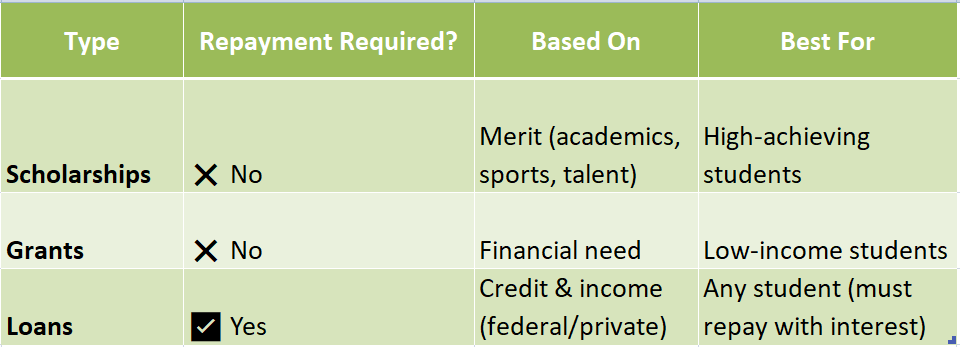
Understanding Graduate School Scholarships: What You Need to Know
Understanding how to secure Graduate School Scholarships is crucial for many students. Graduate school can be expensive, and scholarships can help lighten the financial burden. Knowing where to look and how to apply can make all the difference in your educational journey.
Types of Scholarships
- Merit-Based Scholarships: Awarded for academic achievements.
- Need-Based Scholarships: Given based on financial need.
- International Scholarships: Specifically for students from outside the country.
Finding Scholarship Opportunities
Start by researching schools and their specific scholarship offerings. Many universities have dedicated pages listing available scholarships. Additionally, websites like Fastweb and Cappex can help you find various scholarship opportunities tailored to your background and interests.
Application Tips
- Start Early: Give yourself plenty of time to gather materials.
- Tailor Your Application: Customize your essays to reflect the scholarship’s values.
- Ask for Recommendations: Strong letters can set you apart from other candidates.
By understanding the different types of graduate school scholarships and knowing where to find them, you can significantly increase your chances of securing funding for your education.
Unlock your potential with online degrees—Learn more!
How to Identify the Right Scholarships for Your Field
Finding the right scholarships for graduate school can be challenging, but securing these funds is essential for reducing financial stress and concentrating on your studies. With a strategic approach, you can discover scholarship opportunities that align with your academic goals.
Research Your Field
Begin by looking for scholarships specific to your discipline. Many organizations provide funding for students in areas like education, engineering, or healthcare. Your university’s financial aid office can be a valuable resource for tailored information.
Utilize Online Resources
Platforms like Fastweb and Cappex can help you locate international scholarships and local funding. By creating a profile, these sites will match you with scholarships suited to your qualifications. Always check eligibility requirements to save time and effort.
Network with Professors and Peers
Engage with your professors and classmates about scholarship opportunities. They may know of lesser-known funding options or can direct you to helpful resources. Networking can reveal scholarships that are not widely advertised.
Stay Organized
Maintain a spreadsheet to track deadlines, requirements, and application statuses. Staying organized will help you manage your time effectively and ensure you don’t miss any important opportunities.
Crafting a Compelling Scholarship Application: Tips and Tricks
Securing scholarships for graduate school can feel like a daunting task, but it’s essential for easing financial burdens. Graduate school scholarships not only help cover tuition but also open doors to new opportunities. With the right approach, you can find scholarship opportunities that align with your goals and dreams.
Understand the Requirements
Before diving into applications, take time to research each scholarship’s requirements. Some may focus on academic achievements, while others might prioritize community service or leadership skills. Knowing what each scholarship seeks will help you tailor your application effectively.
Craft Your Story
Your application should tell a compelling story. Share your journey, challenges, and aspirations. Highlight how receiving a scholarship will impact your future. Remember, scholarship committees are looking for passion and potential, so let your personality shine through!
Proofread and Seek Feedback
Once you’ve crafted your application, don’t forget to proofread! Spelling or grammatical errors can detract from your message. Additionally, ask a friend or mentor to review your application. They can provide valuable feedback and help you refine your submission.
The Importance of Recommendation Letters in Securing Graduate School Scholarships
When it comes to securing Graduate School Scholarships, one of the most crucial elements is the recommendation letter. These letters serve as a personal endorsement of your abilities and character, making them a key component in your scholarship application. A strong recommendation can set you apart from other candidates and open doors to various scholarship opportunities.
Why Recommendation Letters Matter
Recommendation letters provide insight into your academic performance and personal qualities. They can highlight your strengths, such as:
- Work ethic: Demonstrating your dedication to your studies.
- Leadership skills: Showing how you can inspire others.
- Passion for your field: Illustrating your commitment to your chosen discipline.
These qualities are especially important for international scholarships, where competition can be fierce.
Tips for Securing Strong Letters
To ensure your recommendation letters shine, consider these tips:
- Choose the right people: Select individuals who know you well and can speak positively about your skills.
- Provide context: Share your goals and achievements with your recommenders to help them write a more personalized letter.
- Follow up: Politely remind them of deadlines to ensure your letters are submitted on time.
By focusing on these aspects, you can enhance your chances of securing Graduate School Scholarships and making your academic dreams a reality.
Navigating Financial Aid: Scholarships vs. Grants vs. Loans
Navigating the world of financial aid can feel overwhelming, especially when it comes to securing funding for graduate school. Understanding the differences between scholarships, grants, and loans is crucial. Scholarships are often the most sought-after option because they don’t need to be repaid, making them a fantastic way to ease the financial burden of higher education.
Scholarships
- Graduate School Scholarships are awarded based on merit, need, or specific criteria. They can come from universities, private organizations, or government programs.
- Scholarship Opportunities are abundant, so it’s essential to research and apply early.
Grants
- Unlike scholarships, grants are typically awarded based on financial need. They also don’t require repayment, making them a great option for students who qualify.
Loans
- Loans are funds that you must repay with interest. While they can help cover costs, they can lead to significant debt after graduation. It’s wise to consider scholarships and grants first before turning to loans.
To secure the best financial aid, start by exploring international scholarships if you’re studying abroad. Many universities offer specific scholarships for international students, which can significantly reduce your tuition costs. Additionally, don’t hesitate to reach out to your school’s financial aid office for guidance—they can help you navigate available options and deadlines.

Unlock your potential with online degrees—Learn more!
How to Leverage Your Network for Scholarship Opportunities
Securing graduate school scholarships can feel like a daunting task, but leveraging your network can make it much easier. Your connections might know about scholarship opportunities that aren’t widely advertised, especially for international scholarships. So, let’s explore how to tap into your network effectively!
Reach Out to Professors and Advisors
Your professors and academic advisors are invaluable resources. They often have insights into graduate school scholarships and can guide you toward opportunities that fit your field of study. Don’t hesitate to ask them for advice or recommendations!
Connect with Alumni
Alumni from your school can be a goldmine of information. They may have pursued similar paths and can share their experiences with securing graduate school scholarships. Consider reaching out through social media or alumni networks to ask about their journeys and any tips they might have.
Attend Networking Events
Participating in networking events can open doors to scholarship opportunities. These gatherings allow you to meet professionals in your field who may know about available funding. Plus, you can build relationships that could lead to mentorship or job opportunities later on.
The Role of Personal Statements in Graduate School Scholarship Applications
When it comes to securing graduate school scholarships, your personal statement can make all the difference. This is your chance to tell your story, showcase your passion, and explain why you deserve financial support. A well-crafted personal statement can open doors to various scholarship opportunities, including international scholarships that can help you study abroad.
Why Personal Statements Matter
Your personal statement is more than just a requirement; it’s your opportunity to shine. Here’s why it’s crucial:
- Showcase Your Unique Journey: Share your experiences and challenges that shaped your academic path.
- Express Your Goals: Clearly outline your career aspirations and how the scholarship will help you achieve them.
- Connect with the Committee: A heartfelt narrative can resonate with scholarship committees, making them more likely to support you.
Tips for Writing an Effective Personal Statement
To create a compelling personal statement, consider these tips:
- Be Authentic: Write in your own voice and be honest about your experiences.
- Stay Focused: Stick to the prompt and ensure your statement is relevant to the scholarship.
- Edit and Revise: Don’t hesitate to ask for feedback and make necessary changes. A polished statement reflects your commitment to excellence.
How CollegeAndTuition.com Can Help You Find the Best Graduate School Scholarships
Securing scholarships for graduate school can feel like a daunting task, but it’s essential for easing the financial burden of higher education. With the right resources, you can discover various scholarship opportunities that fit your needs. Let’s explore how CollegeAndTuition.com can guide you in this journey!
Discovering Graduate School Scholarships
Finding the right graduate school scholarships is crucial. CollegeAndTuition.com offers a comprehensive database of scholarships tailored to your field of study. You can easily search for scholarships based on your interests, background, and academic achievements. This way, you can focus on opportunities that truly matter to you!
Exploring International Scholarships
If you’re an international student, don’t worry! CollegeAndTuition.com also highlights international scholarships that can help you study abroad. These scholarships often cover tuition and living expenses, making it easier for you to pursue your dreams. Plus, you’ll gain valuable experiences in a new culture!
Tips for Applying
- Start Early: Begin your scholarship search as soon as possible.
- Stay Organized: Keep track of deadlines and requirements.
- Tailor Your Applications: Customize your essays to match each scholarship’s goals.
With these tips and the resources from CollegeAndTuition.com, you’ll be well on your way to securing the funding you need for graduate school!
Unlock your potential with online degrees—Learn more!
FAQs
-
What are graduate school scholarships?
Graduate school scholarships are financial awards that help students cover tuition, fees, and other educational expenses. Unlike loans, they do not need to be repaid. -
Are scholarships available for all graduate programs?
Yes, scholarships are available for a variety of graduate programs, including master’s, Ph.D., law, business, and medical degrees. -
Who provides graduate school scholarships?
Scholarships can come from universities, government agencies, private organizations, nonprofits, and professional associations. -
Can international students apply for graduate scholarships?
Yes, many universities and organizations offer scholarships for international students, but eligibility criteria may vary. -
What are the eligibility requirements for graduate scholarships?
Eligibility criteria vary but may include academic performance, leadership skills, research experience, financial need, and field of study. -
How do I apply for graduate school scholarships?
The application process typically involves submitting an online form, academic transcripts, recommendation letters, a personal statement, and sometimes a research proposal.





